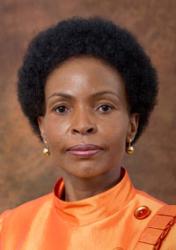Honourable Minister Wang Yi
Honourable Minister Ferreira
Honourable Minister Lavrov
Honourable Minister of State, General Singh
Your Excellencies, BRICS Sherpas and senior officials
Ladies and gentlemen
Allow me, first of all, to thank you His Excellency, Minister Wang Yi, for hosting us for this first formal meeting of the Brics Ministers for Foreign Affairs and International Relations. We are honoured to be here and look forward to our deliberations.
The year 2017 has been declared by our government as the year of Oliver Reginald Tambo, affectionately known as OR to our people, one of the most outstanding leaders of the liberation struggle who mobilised international solidarity against apartheid and contributed to shaping the vision of a post-apartheid democratic South Africa. OR's words at the first congress of the MPLA in Luanda in 1977, when he said: "We seek to live in peace with our neighbours and the peoples of the world in conditions of equality, mutual respect and equal advantage", remain at the core of our foreign policy. His words mobilised the largest truly global solidarity movement; rooted on the African continent and extending to the global South and the North. As we celebrate the centenary of OR Tambo, as well as the first golden decade of BRICS cooperation, we draw inspiration from his exemplary leadership and from the vision that accorded him the accolade of an international statesman and an astute, consummate diplomat. We are delighted that the very values and principles his leadership upheld also find expression in the BRICS context, which we refer to as the Sanya principles, namely openness, solidarity, equality, mutual understanding, inclusiveness and mutually beneficial cooperation.
Excellencies,
BRICS has nourished Africa's economic emergence. The historic ties of solidarity, which were forged at the Bandung Conference of 1995, have indeed created a new template for global affairs, as BRICS is increasingly being called upon to show demonstrable leadership on global issues, notably as we set new regimes for guiding our future global engagements. Our foreign policy envisions exactly the same aspirations for our domestic, regional and global agendas. South Africa believes that a people-centred development agenda based on the recently adopted sustainable development goals (SDGs) should be the basis for addressing the myriad of challenges that confront nations across the globe, including those of peace and security.
Excellencies,
The United Nations (UN), with its near universal membership and vast agenda, remains the primary multilateral institution and the centre of global governance. Our key priority is the advancement of the reform agenda in order to make the United Nations more representative and to further strengthen it. In its current state, the UN has failed to curb unilateral actions by powerful nations who undermine its founding principles, very often with disastrous consequences. The political instability in Libya, for example, is the direct result of the refusal of some States to heed the African Union's call for political dialogue instead of guns and bombs.
These practices risk the reversal of gains made by the collective, including the implementation of the Paris Climate Change Agreement. The droughts experienced in Southern Africa in 2016, as well as other climatic occurrences, make it important for us as a country to highlight and champion any progress that seeks to provide concrete solutions to the adverse effects of climate change. There is only one planet earth, and for the sake of our own, and of future generations, we must employ every effort at our disposal to reverse the effects of climate change; and we must take measures to safeguard against further degradation.
The recent terror attacks in the world, including in BRICS countries, make it necessary for South Africa to re-emphasise that terrorism in all its forms and from whichever quarter cannot be condoned. We join the clarion call for the total isolation and eradication of all terror groups. They have no place among the community of nations.
Further to this, the prevalent pockets of instability and insecurity scattered throughout the world, including our own African continent, remain a challenge. In order to overcome this, it is essential that we identify and consider an alternative narrative capable of tackling the complexity of these challenges.
It is up to us as the BRICS collective to provide solutions for common challenges, to challenge the status quo where it is not benefitting the masses of our people, and to constantly seek justice, equity and development in order to combat the triple challenges of poverty, inequality and unemployment.
In conclusion, I would like to congratulate my Chinese counterpart on China's excellent execution of its Chairship of BRICS and I commend the Chair's initiative to host a stand-alone meeting of BRICS Foreign Affairs/International Relations Ministers. It is my sincere wish that going forward, this meeting will become part of the formal calendar of BRICS meetings and I look forward to hosting you in this regard in South Africa in 2018.
I thank you.



